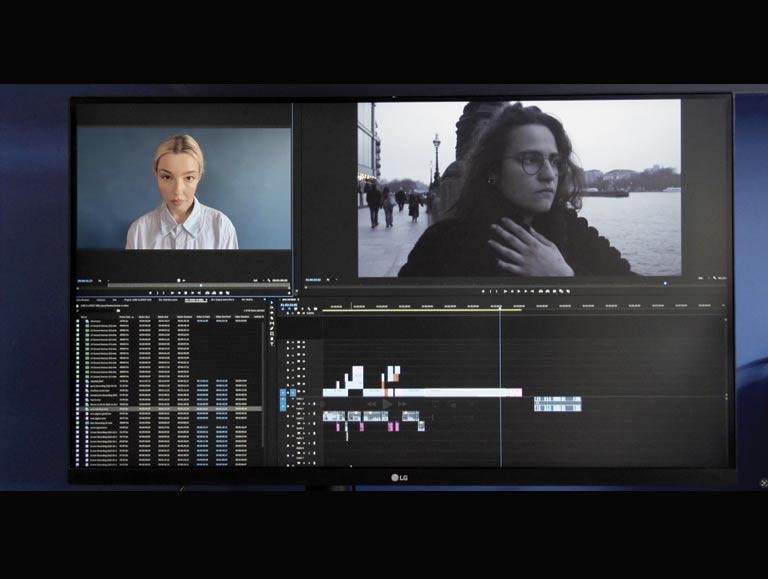World
Marc Isaacs’ ‘Synthetic Sincerity’ Examines AI’s Quest for Authenticity

The new feature film Synthetic Sincerity, directed by British filmmaker Marc Isaacs, delves into the complex relationship between humanity and artificial intelligence (AI). Premiering at the International Documentary Film Festival Amsterdam (IDFA) this Sunday, the film explores whether AI characters can be taught authenticity, a question that resonates deeply in today’s rapidly evolving technological landscape.
Isaacs’ film merges documentary and fictional elements, presenting a narrative that blurs the boundaries between reality and fiction. By collaborating with the Synthetic Sincerity Lab, an AI research initiative associated with the University of Southern England, Isaacs investigates the potential for AI characters to embody genuine emotional experiences. The film’s unique approach combines humor and absurdity to question the nature of storytelling in the age of generative AI.
In the film, Isaacs strikes a deal with the lab to film the process of teaching AI characters authenticity. He focuses on a character created in partnership with Romanian actress Illinca Manolache, who guides him through this exploration. The character is designed to challenge Isaacs’ understanding of human behavior and interaction. “They allow Isaacs to film the process,” reads the film’s synopsis, which highlights the key role of research in shaping the narrative.
The film also introduces an Uyghur chef who becomes a subject of study, raising profound questions about communication and identity. Isaacs captures the chef’s struggle to articulate thoughts and emotions, both as a human and as an AI representation. The screenplay, co-written by Adam Ganz, emphasizes the film’s thematic depth, examining the implications of AI in storytelling.
Exploring the Intersection of Fact and Fiction
In a recent interview, Isaacs shared insights into the creative process behind Synthetic Sincerity. He noted that the collaboration depicted in the film is fictional, created to serve the narrative. “What they’re doing in the film is complete fiction. They don’t work in this area at all,” he explained. This deliberate blending of genres allows Isaacs to investigate themes of authenticity and the future of media.
The film serves as a continuation of Isaacs’ previous works, including The Filmmaker’s House and This Blessed Plot, which also navigated the boundaries of reality and fiction. “We thought we had to do something that was looking at what’s happening to the human face,” he said, reflecting on the evolution of storytelling in the context of AI.
The female AI character, who plays a pivotal role in the film, was developed using a combination of advanced technology and human creativity. Isaacs revealed that he initially created the character using a platform called Synthesia, which generates avatars. However, after meeting Manolache, he decided to incorporate her likeness, resulting in a character that embodies both human and AI traits.
The Future of AI in Film
Isaacs acknowledges the dual nature of AI’s impact on the film industry. He recognizes both the potential for innovative storytelling and the ethical challenges it presents. “It’s so early to really understand what’s going on, but I think that, like any tool, it takes things in a different direction,” he commented. This perspective invites audiences to reflect on the implications of AI-generated content and its influence on representation in media.
In his exploration of AI, Isaacs also raises important questions about the essence of authenticity in storytelling. He believes that AI does not merely represent reality but creates new narratives from scratch. “If you think about it, AI isn’t even representation, is it? Because it’s not representing anything,” he stated, emphasizing the need for critical reflection on the medium of film and the evolution of images in the digital age.
As Synthetic Sincerity prepares for its world premiere, Isaacs continues to engage with these profound themes, encouraging audiences to consider the future of storytelling in a world increasingly influenced by AI. The film not only challenges conventional notions of truth in cinema but also invites a broader discussion on the ethical ramifications of artificial intelligence in creative expression.
-

 Top Stories3 weeks ago
Top Stories3 weeks agoMarc Buoniconti’s Legacy: 40 Years Later, Lives Transformed
-

 Health3 weeks ago
Health3 weeks agoInnovative Surgery Restores Confidence for Breast Cancer Patients
-

 Business2 weeks ago
Business2 weeks agoForeign Inflows into Japan Stocks Surge to ¥1.34 Trillion
-

 Sports1 month ago
Sports1 month agoSteve Kerr Supports Jonathan Kuminga After Ejection in Preseason Game
-

 Top Stories3 weeks ago
Top Stories3 weeks agoBOYNEXTDOOR’s Jaehyun Faces Backlash Amid BTS-TWICE Controversy
-

 Science1 month ago
Science1 month agoChicago’s Viral ‘Rat Hole’ Likely Created by Squirrel, Study Reveals
-

 Lifestyle1 month ago
Lifestyle1 month agoKelsea Ballerini Launches ‘Burn the Baggage’ Candle with Ranger Station
-

 Entertainment1 month ago
Entertainment1 month agoZoe Saldana Advocates for James Cameron’s Avatar Documentary
-

 Science2 weeks ago
Science2 weeks agoUniversity of Hawaiʻi Joins $25.6M AI Project to Monitor Disasters
-

 Politics1 month ago
Politics1 month agoDallin H. Oaks Assumes Leadership of Latter-day Saints Church
-

 Lifestyle1 month ago
Lifestyle1 month agoDua Lipa Celebrates Passing GCSE Spanish During World Tour
-

 Business1 month ago
Business1 month agoTyler Technologies Set to Reveal Q3 2025 Earnings on October 22









